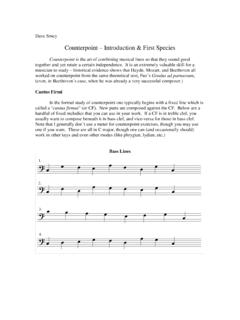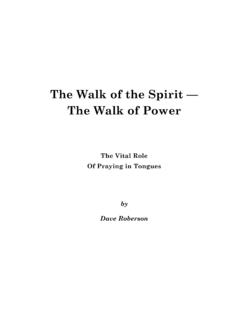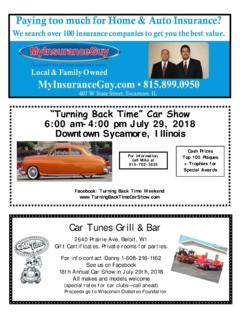Transcription of Shrink Rap Radio #418 28th August, 2014 “How to be an ...
1 Transcribed from Shrink Rap Radio #418 How to be an Adult in Love with Dr. David Richo PhD Page 1 of 11 Shrink Rap Radio #418 28th August, 2014 How to be an Adult in Love Dr. David Van Nuys , aka Dr. Dave interviews Dr. David Richo PhD (Transcribed from by Gloria Oelman) Introduction: My guest today is clinical psychologist and spiritual teacher, Dr. David Richo, who is also the author of How to be an Adult in Love: Letting Love in Safely and Showing it Recklessly. You can find out more about Dr. David Richo by visiting our show notes for this episode on Now here s the interview. Dr. Dave: Dr. David Richo welcome to Shrink Rap Radio . David Richo: Thanks for having me. Dr. Dave: Well, I'm really glad to have you. Actually you were suggested as a guest by one of my listeners and I was shocked that you've written so much and that I was unaware of your work even though we're both located in the Bay area.
2 So I was surprised and delighted to discover you and your work and really happy to have you on the show. David Richo: Well thanks, Dave. Dr. Dave: I wonder if you could tell us a bit about your background. How you got into becoming a psychotherapist, where you went to school, 'cause a lot of the people who listen are students; either wannabe students, students in process, former students etcetera, so tell us a bit about your pathway into psychology and where you went to school and graduate school and how you got interested in Jung and Buddhism and all of that. David Richo: I began by going to a Catholic Seminary and I was ordained a priest in 1996. Dr. Dave: Ah! David Richo: Then I left the priesthood to be married and that's when I found Jung and Buddhism and I concentrated on that and got my license as a psychotherapist. Dr. Dave: that makes a certain kind of sense to me, having read your book. Where did you get PhD?
3 David Richo: I went to Fairfield University in Connecticut, which is a Jesuit University. That s where I got my Masters and then my doctorate was a combination Transcribed from Shrink Rap Radio #418 How to be an Adult in Love with Dr. David Richo PhD Page 2 of 11 of going to Boston University where I did the coursework and then I got involved in a University without walls, (unclear) University here in California and that's where I got my PhD. Dr. Dave: Okay, okay well, boy, you have really earned your stripes. It looks to me like this might be your sixteenth book How to be an Adult in Love. Am I right about that it's about sixteen? David Richo: I think it's thirteen because some are revised. Dr. Dave: Okay, well that's still a very impressive number and you're still going, right? David Richo: Yes. My new one is going to be called The Power of Grace and that comes out in October. Dr. Dave: Aha!
4 Okay, well we will be looking forward to that. Your work is very informed by both the Jungian perspective and the Buddhist perspective and in the preface of your book on How to be an Adult in Love, you say that writing is part of your spiritual practice. I thought that was very interesting. How so? David Richo: I consider it a way of making a contribution to the health and spirituality of others, by sharing what comes through to me and so in that sense it feels like a spiritual practice. Dr. Dave: Hm, hmm and how about the discipline of writing? David Richo: I actually enjoy it, so it isn't really a discipline. Dr. Dave: Okay (laughs) okay. We're going to be discussing what I think is your most recent book which is How to be an Adult in Love. David Richo: Hm, hmm. Dr. Dave: Are you implying by that title that it's tough for us to take a grown up approach to our relationships? David Richo: Yes. My other book is How to be Adults in Relationships and this is a follow up based on the Buddhist practice of loving kindness, in which we show love not only in relationships but to ourselves first, then in relationships, then to the people that we have difficulties with and then finally to all beings.
5 Hence it's a more spiritually oriented book than How to be Adults in Relationships. Dr. Dave: Aha, yes because I certainly got that it was very spiritually oriented. On the face of it one would think that giving and receiving love would be the simplest and the most natural of things but most of us encounter challenges along the way. What's up with that? David Richo: The main thing that gets in the way, as far as I can see, is our ego which is a kind of self-centeredness that it's hard to be free of and in that self- Transcribed from Shrink Rap Radio #418 How to be an Adult in Love with Dr. David Richo PhD Page 3 of 11 centeredness we believe that we're entitled to special treatment and that if people hurt us we can retaliate. This is also called a big ego, or a kind of arrogance and the way I see it, is that is the main obstacle to the kind of giving and receiving that happens in a love relationship, where you have to go outside yourself to the other person.
6 Dr. Dave: You know incidentally, speaking of that entitlement and arrogance, one of my colleagues at Sonoma State University was under the impression that a sense of entitlement seems to be on the increase. That's what she was experiencing in her teaching over the years, that it seemed like more and more students came into it with a sense of entitlement. It's a little bit of a divergence from your book but I wonder if you have any impression about that. David Richo: Yes I can see how that would fit because you know we've brought up this generation to have so much and to believe that what they have is something they're entitled to and don't really have to work for, which wasn t quite the perspective in my own childhood and growing up. Dr. Dave: Right, right. Nor in mine. I really like, in your book, it's very rich with wonderful phrases. I think it must come from your Buddhist orientation, sort of they're almost Zen-like turns of speech and one that I really like in your introduction, you write that the love in us arises from an innate goodness.
7 Something about that really resonated for me I guess because deep down somewhere in myself I feel like I'm good, not that I'm perfect in any way but I hadn't linked love with that sense of innate goodness. Maybe you could tell us a bit more about that. David Richo: I'm a believer that every person has an innate goodness and that the more we are loved, the more does it come out. St Augustine has an interesting statement: "everything we do, we do for good, even sin." So, we're always moving in the direction of what we imagine to be good for ourselves and I'm adding to that a recognition that we also happen to have true goodness in us but it's always up to us to make the choices that manifest it because we also have a shadow side, a dark side that militates against the goodness and makes it possible for us to choose paths that aren't in our best good or for the best good of others. So just having the goodness is a wonderful thing but it doesn't really make much difference if we don't make the choices that support it and mirror it into the world.
8 Dr. Dave: Yeah, that certainly makes sense to me. I also love the turn of phrase when you say: "love sits in us some place between trust and fear." Maybe you can say a bit about that. David Richo: We trust in a relationship when we notice that the other person is trustworthy and at the same time the closeness that follows from the trust might be scary to us because closeness is associated with fear. We're afraid if we get too close, or let the other person get too close, we might lose our personal freedom. We might be absorbed in the other person, we might be engulfed and so there's hardly any relationship that doesn't include some kind of fear. Or you could also have the fear of being abandoned by the other because you don t yet fully trust that the other will really stay with you through thick and thin. So that s what I meant by most relationships happen somewhere between trust and fear. Transcribed from Shrink Rap Radio #418 How to be an Adult in Love with Dr.
9 David Richo PhD Page 4 of 11 Dr. Dave: Yeah, yeah that's very compact but it says a lot. What's the relationship between love for oneself and love for the other? David Richo: How do you mean? You mean different kinds of love, Dr. Dave: Well, actually this is something I think that you discussed at some length in the book. Isn't there a way that they feed each other, that the ability to love oneself feeds the ability to love the other and love for and from the other feeds the ability to love oneself? David Richo: Oh, I see what you man. Yeah, they interact and mirror each other basically I'm proposing that love means, or is expressed by, five very particular styles of behavior which I call the five A's, since they all begin with 'A.' You pay attention to the other, to his or her feelings and intuitions and so forth. You accept the other just as he or she is. You appreciate. You show affection, physically and appropriately and at the same time you allow the other person to make the choices that he or she needs to make, even if one of those choices is to leave you.
10 So those same five A's you could apply to yourself. I pay attention to my own needs and feelings and advocate for myself with regard to them. I accept myself as I am rather than judge myself, or feel ashamed or guilty when it's not appropriate. I appreciate myself, I take care of myself affectionately and I allow myself to make the choices that are based on my deepest needs and wishes. And when I do that for myself it's more easy to do it for someone else. Dr. Dave: Hm. Hmm. Yeah, I really like that five A's schema that you develop in the book and it becomes a kind of motif that you pick up in relation to several topics as one moves through the book and we'll probably have reason to touch back on that again. I wanted to highlighted another one of these very pregnant little phrases in your writing, where you say "true love makes every one irresistible." Perhaps you can unpack that one for us. David Richo: I'm referring to the loving-kindness practice which is one of the main practices in Buddhism in which you beam out love and aspirations for happiness for yourself and others and when you do this it makes everyone more appealing because you see them all as in your circle of love.




